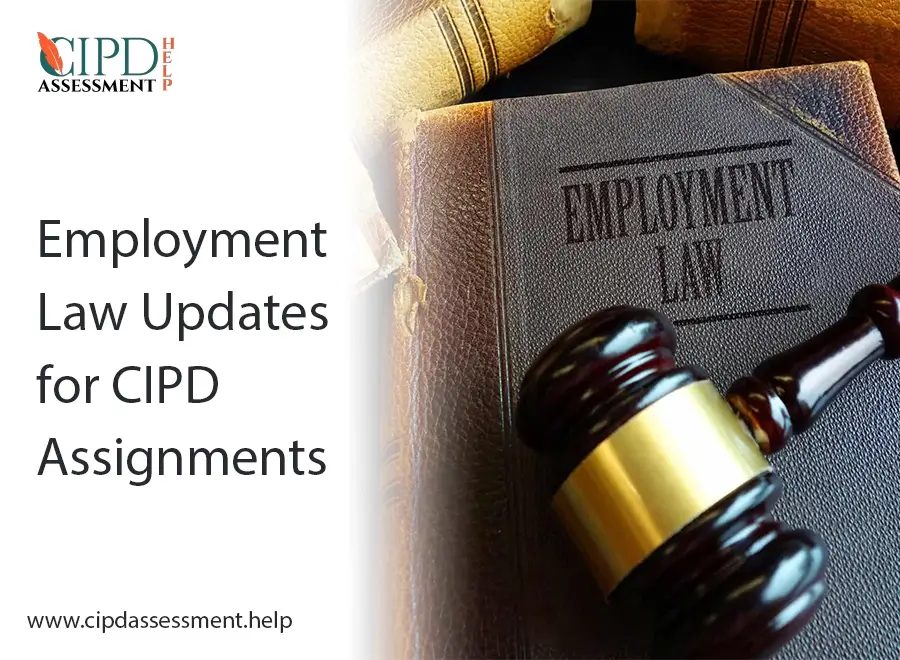Suppose that you are working on a CIPD assignment on employee rights. Then there is a stroke of luck when a new law comes along and alters the whole situation on unfair dismissal. How do you incorporate that on your paper without dropping a beat?
Keeping abreast of the employment law issues is important to both CIPD students and HR professionals. It influences the way you do case studies or develop policies. New updates make your work up-to-date and world-ready.
This blog looks into major modifications since 2023. Preciosity on the HR work will be observed. Also, hints to impress your work with brilliant, ethical work.
Current Employment law changes in legislation.
Since 2023, the UK employment law has experienced massive changes. Such actions are meant to increase worker rights and seal ancient loopholes. In case of CIPD assignments, they will append layers to issues such as rights and responsibilities.
Consider these updates to be guardrails to fair workplaces. They make HR reconsider previous practices. Such official sources as ACAS and gov.uk provide solid facts to support your arguments.
To drag them into your work is to think hard. It ties law to practice. Let’s break down the main ones.
The Effect of the Employment Rights Bill 2024.
The Employment Rights Bill 2024 has radical modifications. It shortens the time of wait before unfair dismissal to day one to most of the workers. No longer in the majority of cases a two-year obstacle.
Zero-hours contracts are also curtailed. The employers should provide constant working hours beyond the fixed hours. The family leave is boosted with vacation and higher pays.
This is important for CIPD Assignment Help on employee recruitment or retention. It increases the risks of the employer at the very beginning. Test yourself: Plot out how companies evaluate risk in your paper. Use the ACAS manual to demonstrate actual steps.
These regulations would reduce turnover. According to Stats of the TUC, the day-one rights could benefit 1.5 million more workers. Counterbalance that in assignments with business costs.
Revisions of Flexible Working Regulations.
Flexible working regulations were updated in April 2024. It will now allow employees to ask twice a year, which is an increase over one. Bosses should respond within two months and not three.
This suits the emergence of hybrid arrangements. There is a desire to have balance following the boom of remote work. It challenges HR to either say no or yes with definite reasons.
Highlight this in CIPD work with work models. Include an example of a company that is multitasking with the demands. It depicts compliance obstacles such as time schedule setbacks.
ACAS mentions that faster negotiations reduced disagreement by one-fifth. Use that data in your paper. It demonstrates the reason why fast responses foster trust.
Equality and Diversity Laws Improvements.
The 2023 Worker Protection Act amends the Equality Act. Companies have to take action on the threat of harassment.
Waiting days, no longer waiting days.
It introduces obligations to prevent bullying based on defended characteristics. Like gender or race. This is directly connected to the push of diverse teams by CIPD.
To do assignments on inclusion, take this. Draw a policy rollout flow chart. It assists in demonstrating the way to incorporate law in everyday HR.
Ties to ethics shine here. According to McKinsey, 19% more profit can be observed in various spots. And argue In your work to fuse gains with law.
CIPD Assignments areas of focus.
These legal changes are pointers to fundamental CIPD themes. Similar to talent identification, remuneration arrangements and employee relationships. Your work must be in depth and not fact listings.
Striking balance between law and firm objectives. That makes your case strong. Here, tips can be used to organize your points.
Begin with the restructuring of basics by laws. Then add your views. It keeps things fresh.
Reforms in Recruitment and Onboarding.
The 2024 Code of Practice limits fire-and-rehire. Bad deals are not easy to push off by bosses. It protects against imposed modifications.
The right-to-work checks were made stricter. Electronic evidence is fast. But errors cost fines up to £20,000.
Associate this with the people standards of CIPD. The bias of critique in employment using law. It provides a justifiable perspective in your assignment.
Tells about Gaps in old advertisements that do not obey new rules.
Calculate compliance tool costs.
Recommend training to reduce slips-ups.
This constructs arguments that are rounded.
Dismissals and Performance Management.
Emerging policies eliminate a two year waiting period on unfair dismissal claims. Workers will be able to retaliate earlier. It upsets the management of poor fits.
ACAS has more aggressive talks in advance of cuts. Similar to group sessions and note taking. Miss that, and tribunals bite.
In assignments, rate dismissal processes are in violation of these laws. Templates: List old ways, new rules, fixes needed.
Expect an increase in claims – increased by 15% in the previous year, according to gov.uk. Demonstrate the effect on firm plans. Add tips for fair checks.
Provisions of Health, Safety and Wellbeing.
The 2023 revision of the Health and Safety at Work Act includes menopausal support. Companies will have to adapt to such symptoms as hot flushes. Mental health responsibilities become excessive.
Enough stress signs will be overlooked. These spots are now risk checked. It is equivalent to the wellbeing push of CIPD.
Include a risk matrix to your paper. Plug in laws like these. It shows smart planning.
According to data provided by HSE, 1.6 million sick days are associated with menopause. Use that to push for changes. Link it to lower absences.



